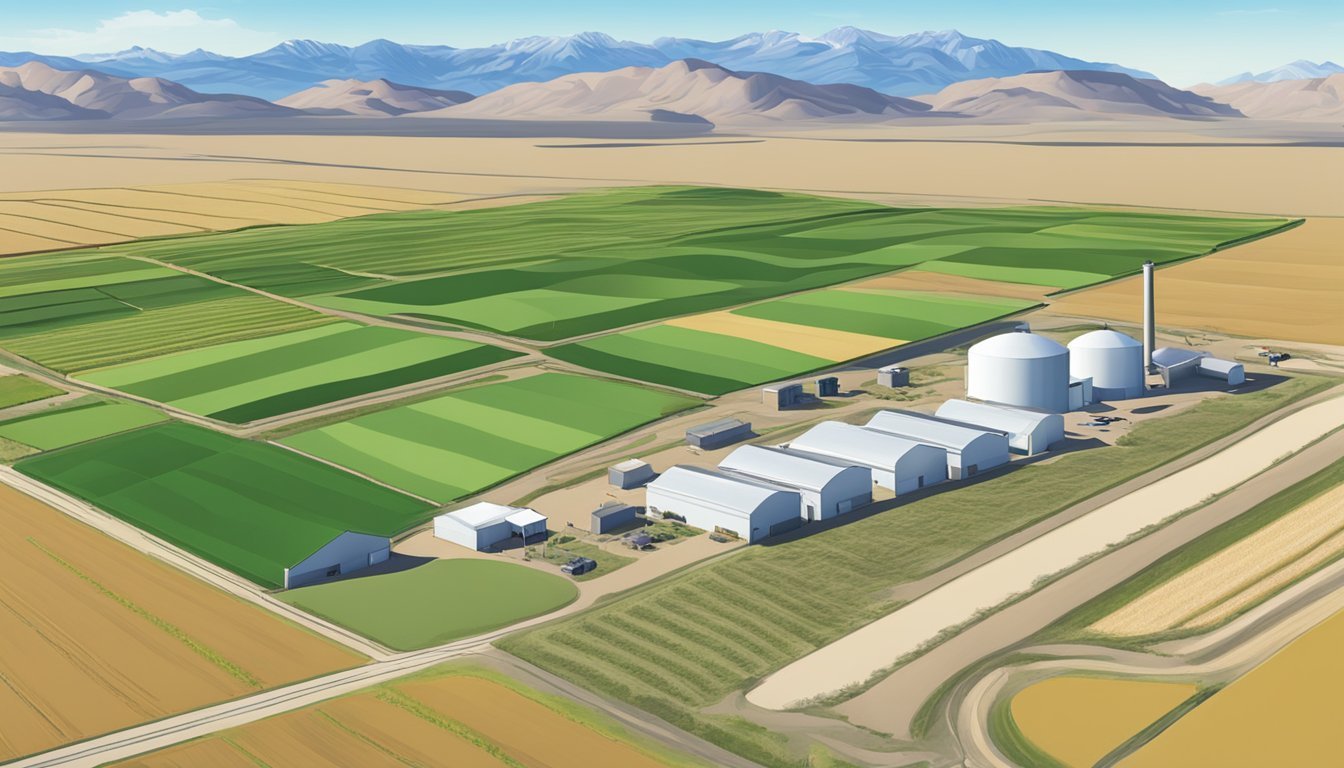Nevada Farm Land for Lease
Opportunities and Insights
This Article is Part of Our Guide on Navigating Agricultural Leases Across the US
Nevada offers a unique landscape for those interested in leasing farmland, with options ranging from high desert to lush valley terrains. The state's vast and varied geography caters to a selection of agricultural ventures. Potential lessees can explore opportunities in counties like Elko, where larger tracts of land are available, or they can focus on smaller acreages near municipalities such as Reno, Carson City, or Las Vegas, depending on their farming needs and business goals.
The real estate market in Nevada provides various leasing terms to accommodate different farming scales and operations. From long-term leases for established farms to shorter agreements for start-ups or experimental farming, Nevada's agricultural land for lease is adaptable to a wide array of agricultural projects. Land seekers can find properties equipped for large-scale ranching, small organic farming, or even plots suitable for niche markets.
As with any real estate endeavor, those looking to lease farm land in Nevada should conduct thorough due diligence. Ensuring soil quality, water rights, and zoning regulations align with their intended use is crucial. With its open spaces and business-friendly environment, Nevada continues to be an appealing destination for farmers and investors seeking to rent land for agricultural use.
Understanding Farm Leases
Farm leases are contractual agreements critical for any commercial agricultural venture. They define the terms under which farmers rent farm land, encompassing a variety of lease types, each with its own set of benefits and challenges.
Types of Farm Leases
Cash Rent Lease: The farmer pays a fixed amount of rent for the use of farm land. It is simple and provides security for both parties, but may not account for fluctuating agricultural market conditions.
Sharecropping Lease: Rent is a portion of the crop yield. The ratio, such as 60% to the farmer and 40% to the landowner, is predetermined. This lease aligns costs with revenues but can vary with yield success.
Flexible Lease: Incorporates aspects from both cash rent and sharecropping. Rent fluctuates based on yields, prices, or revenues, offering a balance of risk and return.
Combination Lease: Involves elements of cash lease and either sharecropping or flexible leases. It allows multiple farmers to lease from the same landowner, promoting collaboration.
Benefits and Challenges
Benefits:
Security: A lease grants the farmer exclusive rights to use the land, providing a stable foundation for business planning and investment.
Flexibility: Different lease types allow for various arrangements suited to the farmer's and landowner's needs and expectations.
Challenges:
Market Dependency: Leases such as sharecropping can lead to unpredictable income depending on the agricultural market fluctuation.
Agreement Complexity: Negotiating the terms of a lease can be complex and requires clear communication to align expectations and responsibilities.
Nevada Farm Land Overview
Nevada offers a unique blend of geographical varieties and climate zones, which directly impact its agriculture sector. With vast expanses of land available for lease, Nevada presents opportunities for a variety of agricultural ventures, ranging from small-scale to extensive acreage operations.
Geography and Climate
Nevada is characterized mostly by its desert topography and semi-arid climate. The state encompasses a wide range of elevations and terrain types, from the low valleys to the high peaks of the Sierra Nevada range. Due to these variations, Nevada experiences considerable differences in temperature and precipitation across the state. The growing season can vary significantly, with northern Nevada typically seeing shorter seasons due to cooler temperatures.
Agriculture Sector
Nevada's agriculture sector is diversified, with a strong emphasis on livestock and crop production. Despite water limitations, the state has developed successful irrigation systems that support its agricultural activities. Farm land in Nevada generally spans large acreages, with land available for lease in various counties. In areas like Elko County in northern Nevada, one can find substantial parcels of land, with several listings offering hundreds of acres suitable for agricultural use. The state's agriculture is vital to the local economy and presents potential for both new and seasoned farmers seeking land for lease.
Leasing Options and Terms
When considering Nevada farm land for lease, potential lessees will encounter various structuring options, financial considerations, and legal requirements. These factors can significantly affect the cost, usage, and legal standing of the leased acreage.
Lease Structuring
Lease agreements for farm land in Nevada come in multiple forms. The cash rent lease is straightforward, with payments made on a per acre or whole property basis. For instance, rates can range significantly depending on the land's location and quality, but a lessee may encounter offers such as $1,000 per month for smaller acreage or upwards for larger plots. Another approach is crop share leasing, where the landowner receives a portion of the agricultural produce as rent. Additionally, flexible leases may be an option, where rent is tied to commodity prices or yields, providing a variable rate reflective of the farming success.
Financial Considerations
The financial obligations in leasing farm land involve more than just the base rent. Prospective lessees should note:
Rent: It's often established on a per acre basis (e.g., $ / ac min to $ / ac max).
Maintenance and repair responsibilities: Typically outlined in the lease.
Owner financing options: These may influence the lease terms, offering a purchase option at the end of the lease.
Status: Always ascertain if the land is foreclosed or has any liens against it, impacting the leasing terms.
Leasing land costs: Can vary widely, and it's important to negotiate terms that align with the lessee's financial capacity.
Legal Requirements
Legal stipulations are crucial in any lease agreement. They outline the rights and responsibilities of both parties and include elements such as:
Length of the lease: This clarifies how long the lessee can use the land.
Contracts: Must detail the agreed-upon rent and may include revenue sharing arrangements if applicable.
Land for lease status: Should verify that the land is legally available for lease and not entangled in disputes.
Foreclosed properties: If leasing land that has been foreclosed, additional legal considerations and risks are involved.
It's essential for parties engaging in a Nevada farm land lease to conduct due diligence and negotiate terms that safeguard their interests and ensure clarity on all leasing obligations.
Farm Land Types and Uses
Nevada's farm land offerings are diverse, serving various agricultural and recreational purposes. Each type of land is suited to particular uses that are determined by its characteristics such as soil quality, topography, and water availability.
Tillable Farming Ground
Nevada has tillable farming ground that is specifically used for crop production. Known for its arable agricultural land, this type is often characterized by flat terrain and fertile soils suitable for growing a range of crops. Farmers seeking land for activities like wheat cultivation or vegetable farming should prioritize regions with quality tillable ground.
Cattle Pastures and Grazing Land
Extensive cattle pastures and grazing land are crucial for livestock owners. Nevada offers grazing land that could be considered cheap in comparison to more lush regions due to its semi-arid climate. However, it is still sufficiently supportive for cattle and sheep herding activities. Spaces with natural water sources and expansive acreages are ideal as they provide proper nourishment for herds and flocks.
Hunting and Recreational Land
Apart from agricultural use, Nevada farm lands also cater to hunting and recreational activities. Areas teeming with wildlife can serve as excellent hunting grounds, often sought after by those who value the sport and sustenance. Such land can be a mosaic of terrains, providing habitats for various game species.
Selecting the Right Property
When searching for farm land to lease in Nevada, it is important to consider the specific needs of the farming operation, including the size of the property and its location.
Property Size and Suitability
Size is a critical factor when evaluating properties. Prospective lessees need to assess the average property size suitable for their agricultural activities. In Nevada, available properties can range significantly, from modest plots to vast expanses of arable land. For example, listings may present anything from 1 to several hundred acres of land for rent. It's prudent for lessees to determine the minimum acres required for their operations, be it small-scale farming or extensive agricultural enterprises.
1 acre plots are appropriate for hobby farms or specialty crops.
154 acres and above are often suitable for larger scale operations, including livestock and row crops.
The average property size for farming in Nevada typically provides enough space for diverse agricultural activities, allowing for rotation and diversification of crops or the management of livestock.
Location and Accessibility
Location greatly influences the viability of a farming operation. Ideal properties are within reasonable proximity to markets and have adequate infrastructure to support agricultural activities.
Considerations Examples Proximity to Market Properties located near urban centers like Reno or Las Vegas Access to Water Proximity to water sources or rights in arid regions Transportation Accessibility for machinery and delivery vehicles
Accessibility to the property is also paramount. Farms need to be easily accessible for equipment to move in and out, especially during planting and harvest seasons. This includes paved roads or well-maintained dirt roads that can support heavy machinery. Considering Nevada's varied terrain, lessees should ensure the land's accessibility aligns with their specific logistical needs.
Market Insights and Trends
In the realm of Nevada's farmland leasing market, accurate, current data paves the way for both lessors and lessees to make informed decisions. Trends indicate an evolving landscape influenced by various factors, including inflation and its impact on land values.
Current Market Rates
The rates for leasing farmland in Nevada are subject to fluctuations based on market conditions. For instance:
Average Listing Age: The average time a listing remains on the market is around 102 days.
Average Property Size: Reports suggest that the typical property size listed for lease averages at 154.3 acres.
Addressing the lease rates specifically, they can vary greatly depending on location, land quality, and available infrastructure. Ranches, which are a significant part of Nevada’s agricultural real estate, may command different lease rates compared to traditional crop land, given their specific use and maintenance costs.
Demand and Supply Dynamics
Demand for Nevada farm land leases is influenced by external economic factors and the specific utility of the land:
Lease Demand: The interest in leases could be driven by market demands for certain crops or ranching needs, and by the overall economic health of the agricultural sector.
Supply Factors: On the supply side, the quantity and quality of available land for lease, along with how it is marketed to potential lessees, play a crucial role. Effective marketing can shorten the average listing age and improve the match between property and lessee.
These dynamics must be analyzed with a clear understanding that the lease market is inherently connected to the larger economic forces that shape agriculture and real estate in Nevada.
The Leasing Process
When leasing Nevada farmland, the process generally involves a sequence of steps from identifying suitable land to formalizing the agreement. Effective marketing strategies and an understanding of lease terms are critical for both landowners and lessees.
Search and Discovery
Prospective lessees begin by searching for available farm land for lease. They might utilize online platforms or real estate services specializing in agricultural properties. Listings typically include relevant details like lease rates, land area, and the age of the listing. It's important for lessees to assess the suitability of the land for their intended use, considering factors such as soil quality, water availability, and location.
Negotiation and Agreement
Once a potential lessee finds a property that meets their requirements, negotiation commences. During this phase, the conditions of the lease are discussed, including the length of the lease, rent, and whether the payment structure will be a flat rate or based on revenue sharing. Responsibilities for maintenance and repairs must be agreed upon to ensure clear expectations. Both parties should strive to achieve terms that are mutually beneficial.
Closing the Lease
The finalization of the lease is known as closing. This entails the formal signing of the contract, which should be a written document articulating all the agreed terms. A thorough lease agreement protects both the landowner and the lessee by outlining responsibilities and what happens in the event termination of the lease is required. The lessee can then proceed to use the property for agricultural activities as per the contract.
Marketing the property effectively and maintaining accurate, up-to-date listings can facilitate the leasing process, ensuring that agricultural land is put to good use, contributing to Nevada's agricultural productivity.
Management and Maintenance
When leasing farm land in Nevada, lessees must understand the responsibilities associated with the management of agricultural property and the impacts that improvements and investments can have.
Managing Leased Land
The management of leased land involves a clear understanding of the lease agreement. Tenants should ensure they are familiar with the terms that outline management practices and who is responsible for typical maintenance tasks. For example, in Elko County, the lessee may be responsible for maintaining fences and water systems. It's important for both parties to agree on the expected condition of the land at the end of the lease period. Effective management also includes the tenant's right to use the land, which may or may not include establishing a residence on the property, depending on the lease terms.
Land Improvements and Investments
Improvements and investments on leased land can range from infrastructure upgrades to soil health enhancements. Any permanent improvements, such as the construction of new buildings or irrigation systems, typically require the landowner's consent. Here is a list of common land improvements in Nevada:
Water infrastructure: irrigation systems, wells, ponds
Soil amendments: adding compost or manure for fertility
Fencing: for controlled grazing or crop protection
Investments made by the lessee usually enhance the productivity of the farm and, in some agreements, the lessor may contribute to such costs. It's essential for both parties to clearly document these agreements to prevent any misunderstandings related to the investment and its long-term benefits or ownership.
Additional Resources
When seeking farmland for lease in Nevada, individuals have access to various support systems ranging from government-backed programs to professional expertise. These resources aid in securing land leases, understanding agricultural real estate, and navigating the complexities of property transactions.
Government Programs and Incentives
The Natural Resources Conservation Service (NRCS) offers financial assistance through the Agricultural Land Easements program. This initiative supports the protection of agricultural land by helping landowners maintain their property for farming. NRCS may cover up to 50% of the easement value, assisting lessees and owners in preserving agricultural use of their land.
Educational Materials
Prospective lessees can find a wealth of information to guide their decisions. Resources such as land lease listings, average property sizes, and historical data on listing durations assist in evaluating potential lots. Specific educational materials can be found through agricultural extensions or real estate platforms that list property details, including the minimum and maximum acreage available, and offer insights into the state's farm land market.
Resource Type Details Provided Land Lease Listings Acreage, lease terms Real Estate Platforms Market trends, property sizes Agricultural Extensions Farming best practices, land care
Professional Advice and Services
Several agencies and brokers specialize in Nevada farm real estate. Entities like A Ranch Broker connect buyers and sellers, offering services related to farm and ranch properties. They provide expertise on land acquisitions, property valuations, and potential development opportunities. Lessees looking for customized advice may benefit from contacting local brokers to find the best fit for their agricultural needs.
Professional Services:
Real estate acquisition
Property valuation
Lease agreement negotiation








